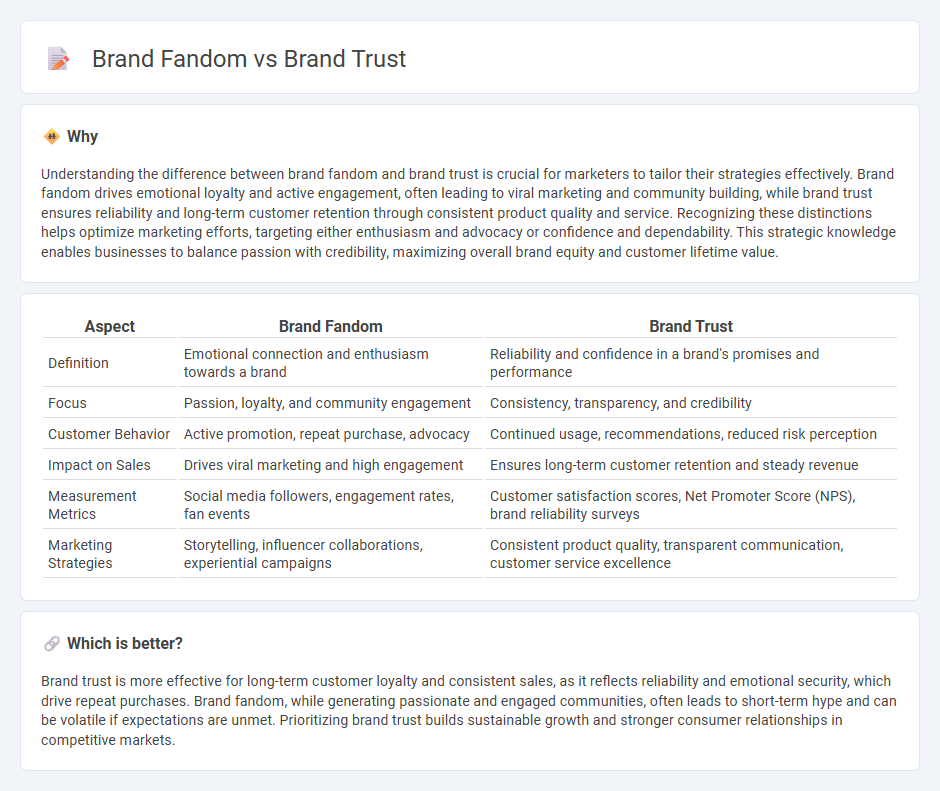
Brand fandom drives emotional connections by fostering loyalty through shared identity and enthusiastic support, while brand trust builds reliability and confidence based on consistent quality and transparency. Both elements are crucial for long-term customer engagement but operate differently in influencing consumer behavior and advocacy. Explore the dynamics between brand fandom and brand trust to optimize your marketing strategy.
Why it is important
Understanding the difference between brand fandom and brand trust is crucial for marketers to tailor their strategies effectively. Brand fandom drives emotional loyalty and active engagement, often leading to viral marketing and community building, while brand trust ensures reliability and long-term customer retention through consistent product quality and service. Recognizing these distinctions helps optimize marketing efforts, targeting either enthusiasm and advocacy or confidence and dependability. This strategic knowledge enables businesses to balance passion with credibility, maximizing overall brand equity and customer lifetime value.
Comparison Table
| Aspect | Brand Fandom | Brand Trust |
|---|---|---|
| Definition | Emotional connection and enthusiasm towards a brand | Reliability and confidence in a brand's promises and performance |
| Focus | Passion, loyalty, and community engagement | Consistency, transparency, and credibility |
| Customer Behavior | Active promotion, repeat purchase, advocacy | Continued usage, recommendations, reduced risk perception |
| Impact on Sales | Drives viral marketing and high engagement | Ensures long-term customer retention and steady revenue |
| Measurement Metrics | Social media followers, engagement rates, fan events | Customer satisfaction scores, Net Promoter Score (NPS), brand reliability surveys |
| Marketing Strategies | Storytelling, influencer collaborations, experiential campaigns | Consistent product quality, transparent communication, customer service excellence |
Which is better?
Brand trust is more effective for long-term customer loyalty and consistent sales, as it reflects reliability and emotional security, which drive repeat purchases. Brand fandom, while generating passionate and engaged communities, often leads to short-term hype and can be volatile if expectations are unmet. Prioritizing brand trust builds sustainable growth and stronger consumer relationships in competitive markets.
Connection
Brand fandom and brand trust are interconnected through consumer loyalty and emotional attachment, which drive repeat purchases and advocacy. Strong brand fandom enhances perceived authenticity and reliability, fostering deeper trust among customers. Trust established through consistent positive experiences solidifies fandom, creating a virtuous cycle of engagement and brand equity growth.
Key Terms
Credibility
Brand trust centers on credibility through consistent product quality, transparency, and reliable customer service, fostering consumer confidence and long-term loyalty. Brand fandom, while influenced by credibility, thrives on emotional connection, community engagement, and shared values that create passionate brand advocates. Explore how building both trust and fandom can elevate your brand's market presence and influence.
Emotional Connection
Brand trust centers on consumers' confidence in a company's reliability, quality, and consistency, which drives loyalty through proven performance. Brand fandom goes deeper by fostering a passionate emotional connection, where fans feel personal attachment and actively promote the brand's identity and community. Explore how building this emotional bond can transform customers into devoted advocates and elevate long-term brand success.
Advocacy
Brand trust centers on consumers' confidence in a company's reliability and product quality, fostering repeat purchases and positive word-of-mouth. Brand fandom goes beyond trust, cultivating emotional attachment and active advocacy through community engagement and shared values. Discover how leveraging brand fandom can amplify customer advocacy and drive long-term growth.
Source and External Links
Brand Trust: What It Is and Why It's Important - Qualtrics - Brand trust refers to the confidence customers have in a brand's ability to deliver on its promises, built through consistent quality, transparency, customer service, and shared values.
Navigating Brand Trust in Modern Marketing - Brand trust is a consumer's belief about a brand's intention and ability to responsibly deliver value, deeply influenced by psychological factors and perceived shared values.
Brand Trust - Definition, Elements, and How to Build It - Amazon Ads - Building brand trust relies on providing quality products, positive customer experiences, and aligning brand values with those of consumers to foster emotional connections and loyalty.
 dowidth.com
dowidth.com